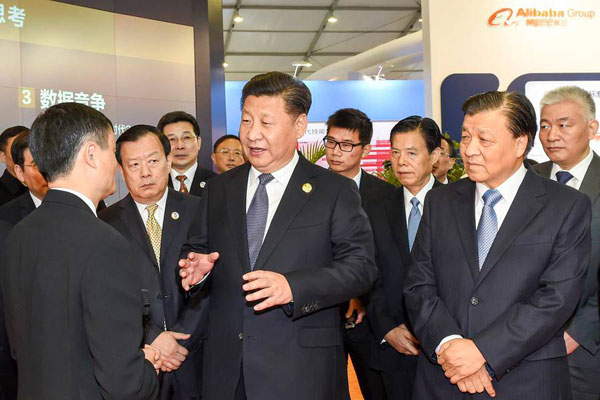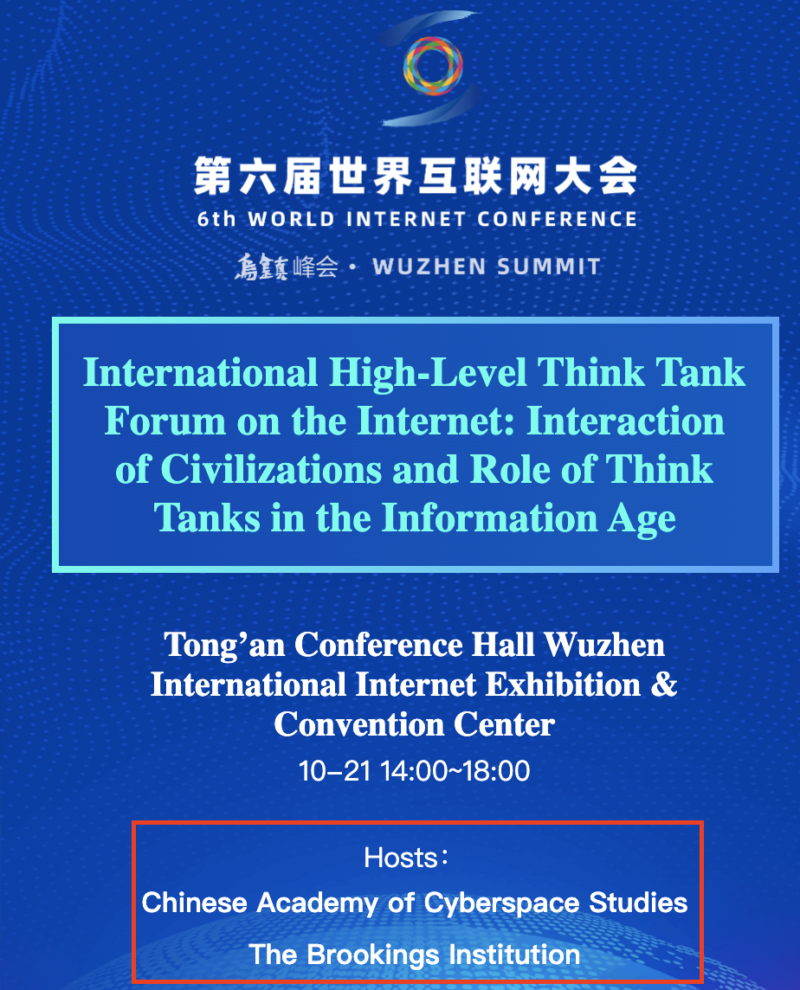EXC: Top U.S. Tech Execs Attended Conference Sponsored By Chinese Communist Group Which Pushed COVID DisInfo Campaign
21 December, 2020
Executives from American tech giants such as Facebook and Google attended an annual conference organized by the Cyberspace Administration of China, the body responsible for leading the Chinese Communist Party’s digital campaign to censor factual narratives and push fraudulent information about COVID-19.
The unearthed attendance of U.S. tech leaders to the World Internet Conference follows leaked documents from the Chinese Communist Party revealing that its Cyberspace Administration – which spearheaded the conference – was tasked with deploying legions of hundreds of thousands of people online.
Executives from American tech giants such as Facebook and Google attended an annual conference organized by the Cyberspace Administration of China, the body responsible for leading the Chinese Communist Party’s digital campaign to censor factual narratives and push fraudulent information about COVID-19.
The unearthed attendance of U.S. tech leaders to the World Internet Conference follows leaked documents from the Chinese Communist Party revealing that its Cyberspace Administration – which spearheaded the conference – was tasked with deploying legions of hundreds of thousands of people online.
These individuals, comprising China’s “wu mao” army, were deployed to combat negative narratives about the Chinese government and peddle misinformation to create a facade that China was adequately containing the virus.
Firewall Fealty.
Conceived in 2014, the annual World Internet Conference is organized by Chinese Communist Party bodies including the Cyberspace Administration of China, the State Council Information Office, and several municipal governments.
In addition to Chinese Communist Party leader Xi Jinping speaking at the conference, companies that have been identified by the Department of Defense as assisting the Chinese military for over two decades such as Huawei, China Telecom, and China Electronics Technology Group, have routinely attended.
Other Chinese companies such as Tencent and ByteDance, whose own the controversial WeChat and TikTok apps, have participated in the conference alongside a bevy of high-level Chinese Communist Party officials.
And the conference’s goal of increased technological collaboration between China and the U.S. is misguided, as the prospect presents a hotbed for government-sanctioned intellectual property theft, espionage, hacking, and cyberattacks.
Despite this, American companies including Microsoft, LinkedIn, Facebook, Apple, and Amazon have participated in the state-run event. In 2017, Apple Chief Executive Officer (CEO) Tim Cook and Google CEO Sundar Pichai took high profile speaking roles at the event.

Facebook executives have attended the conference for over half a decade. In 2016, founder and CEO Mark Zuckerberg also took up a speaking role alongside Vaughan Smith, Vice President of Facebook’s Corporate Development.

These corporates offered their support to their conference even after a 2014 controversy where the conference allegedly attempted to have attendees ratify a 3-page declaration advocating for “enhanced cyberspace connectivity.”
Of paramount concern was collaboration on thwarting breaches of “cybersecurity and cyber terrorism,” a blistering display of hypocrisy in light of the Chinese Communist Party leading the world in sanctioning these attacks.
In The (Think) Tank for China.
Also collaborating on the venture are a host of D.C.-based think tanks that advocate for closer U.S.-China ties such as the Brookings Institution and the National Committee on U.S.-China Relations.
Brookings has repeatedly sent delegations to the conference to participate in forums alongside Chinese Communist Party administered bodies such as the Chinese Academy of Cyberspace Studies, an affiliate of the body that sanctioned COVID-19 misinformation.
In 2019, the institute co-hosted a panel on the “interaction of civilizations and role of think tanks in the information age,” and in 2017, Director of the institute’s China Center Li Cheng spoke on a forum advocating for greater collaboration between U.S. and Chinese tech companies.

Another mainstay in the pro-China lobby group, the National Committee on U.S. China Relations, also sent its President Stephen Orlins to speak at the conference. In 2017, for example, Orlins wanted to ensure that “the internet serves the complementary, rather than the conflicting, interests” of China and the U.S.
Conferences & Collaborators.
American tech companies liaising with Chinese Communist Party linked firms and party members at the World Internet Conference is not an isolated incident.
This exposé follows a long list of National Pulse reporting calling out the same companies for attending a host of conferences bankrolled by the Chinese Communist Party with companies such as Huawei, Tencent, and ByteDance in attendance.

A Zoom executive worked with Chinese authorities to provide data on users located outside of China and ensure the U.S. video-call giant retained market access in the country, according to recently unsealed court documents filed by U.S. federal prosecutors.
The documents detailed internal communications between Zoom employees, which showed that Chinese security authorities made numerous requests to the company for data on users and meetings that discussed political and religious topics Beijing deemed unacceptable. Zoom complied with most of these requests, at times involving users outside of China.
The revelations highlight how users outside of China’s shores are increasingly being caught in the crosshairs as the Chinese Communist Party (CCP) steps up its demands on companies like Zoom to surveil and censor users both at home and abroad. Zoom is a San Jose-based company, whose software is developed in China.





No comments:
Post a Comment
Note: only a member of this blog may post a comment.